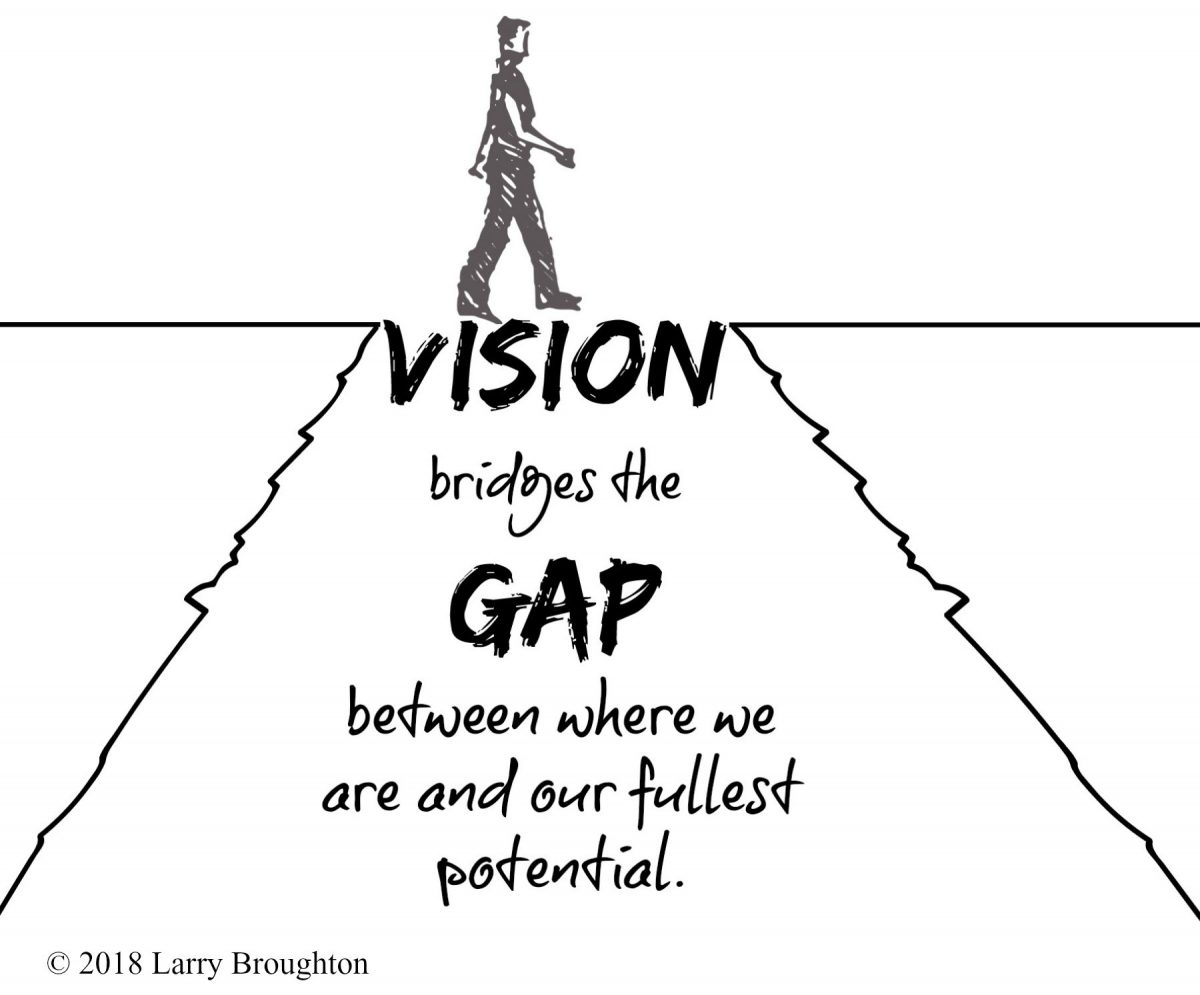Are Vision and Intel Really Important in Business?
Would you like to build an outstanding organization, one that progresses from good to great and beyond? Then you must have a clearly articulated vision and enough intel to guide you and your team.

Many entrepreneurs lack a clear understanding of who they aspire to become, and what they (and their companies) are truly capable of accomplishing. They haven’t yet realized the full positive impact their ideas can have on their families, clients, and the broader community, hence creating a gap between who and where they from their fullest potential or what they want to become.

Why is there the gap? There’s a gap because they haven’t yet learned to apply their own unique strengths, abilities, and core values—the very things that form the foundation of sustainable success—to find their guiding vision for personal and business success.
What is Vision?
Vision is the most important strategy for achieving enduring success in business. Having a vision helps you possess a clear vision of where you’re going as an organization—and as a person.
Vision is the journey and the attainment of your goals. It closes the gap of where and who you are from who you want to become when you reach your fullest potential.
To make it easier to understand what vision is trying closing your eyes and imagine the look and feel of your world when your energy and efforts have served their ultimate purpose … this is a vision, your vision. Your vision doesn’t need to be complicated or earth shattering. In fact, the simpler it is, the more compelling it can be.
My own experience, combined with the experience of other successful entrepreneurs I’ve studied, clearly shows that wildly successful organizations all share several common characteristics. They all have a clear vision of where they are going and exactly what “success” means for them.
Why is Vision Important?
Vision allows you, as a leader, to effectively communicate your ideas, goals, and aspirations. This means more than just physical, quantifiable goals. Your company vision should reflect your own core values—the fundamental principles you’ve chosen to guide everything you do in life, personal & business wise.
Vision is like a compass that defines your culture, keeping you and your team on course towards your aspirational goals, maintaining positive momentum, and inspiring all key stakeholders through the challenges entrepreneurs go through at every level of business.

Many entrepreneurs don’t understand the importance of vision and thus undervalue it. It’s their loss! They’re missing the sense of direction vision provides for their entire team.
Without vision, a.k.a. your entrepreneurial compass, your business is likely to veer off-course when trouble strikes. You’ll sail all over the sea seeking solutions. You might try one thing today, and something else tomorrow, with nothing really coming together.
Running your business without a vision or mission statement is like taking a road trip without a map or a compass: it burns up a lot of fuel, and you might not even reach your destination!
Of course, when running a company, it is inevitable to encounter problems. It might be when the economy starts to tank, revenue starts to slide, competitors open shop right across the street, or you’re going through personnel challenges. Now more than ever, you need to know what’s important to you. You need to know where you want your business to go. You need vision.
With a clear vision, you won’t end up spinning out of control, hoping to find your way when you hit a rough patch. You can get right back on track, without wasting valuable time on trial and error. When you keep vision— your destination—in mind, it always guides you back to what’s important for the journey and what’s essential to your business.
Benefits of Having a Vision
Having a vision helps you understand the appropriate steps you need to make to move forward in the direction of your goals. It excites, refuels, recharges and re-energize your efforts to keep moving forward.
A vision that inspires greatness is both positive and inspirational, defining what life could be. An awesome vision statement will inspire you every time you read it, attract superstars to join you on your quest, and serve as a guide to shape future decisions to grow your life and business.
What is Intel?
Intel is the gathering of key information and insights to gain a competitive advantage. Critical coverage points include (but are certainly not limited to): detailed knowledge of the market for your product or service, analysis of your current or potential competition, and assessment of the resources available to you. Most importantly, your important assets: your own strengths and weaknesses.
Why is Intel Important?
If you’re going to lead your company to the level you envision, you absolutely must do your homework—diligently acquire the information you need and make sure you understand it. Let’s be crystal-clear on this important point: you cannot lead a successful organization without proper intel!
Only by filling the big-picture view with detailed, accurate data in developing your business vision will you enable your team to achieve that vision successfully.
Without reliable intel, you won’t know if achieving your vision is possible!
The keys to your success are not found in some slick business plan. You need to focus on vision, core values, mindset and, of course, good intel. These are the real foundations for your long-term success.
How to Gather Intel
Gathering is much easier to do if you’re working in a field in which you’ve already gained significant experience and contacts. In this case, you should connect with and leverage the resources you already have: your own experience, your current associates or colleagues, your former colleagues, former bosses, and managers, and your circle(s) of industry contacts.
If you’re starting out fresh in a new industry, it’s more of a challenge. So where do you begin? Start by taking the big picture view of your particular industry.
Key questions to outline your industry:
• How large is the market?
• What are the developing trends?
• Who are the major players?
• What are the opportunities and pitfalls?
Trade associations are a great place to start. These associations exist to provide people with facts and statistics about their specific industry, provide continuing education and connect businesses with their clients/customers and suppliers.
Other sources for good intel:
• Industry news reports
• Speeches given by key industry thought leaders
• The presentation program or agenda for industry meetings or trade shows
• Anything else that provides a clear picture of what’s hot
In your research, you’re likely to unearth a few choice nuggets of information that’ll make all the difference to your business. You might discover an underserved niche or identify an emerging trend that you can enter on the ground floor.
How to Analyze and Take Action on the Intel you’ve Gathered
Just gathering information isn’t enough. You must then take the time to analyze and understand this information to be able to use it to your advantage; to turn info into intel. You must develop a plan of action based on your analysis. And finally, you must take action!
As entrepreneurs, we sometimes develop blinders, or “tunnel vision,” that allow us only to see things in a certain way. We get too close to our situations and lack the perspective to put all the pieces together in a way that makes sense. Therefore, we all need to define a group of people we can trust to give us their honest assessment and provide an alternate viewpoint when we get too fixated on a particular course of action – or inaction.
This is one of the merits of developing relationships with people who are bolder and brighter than ourselves. They often perceive things that we miss, either because we don’t yet have the experience or because we are so focused on our “brilliant” idea that we aren’t seeing clearly or understanding the bigger picture.
If you want your intel to be useful, you’ve got to do something with it. You must get the relevant pieces of information to the people who need it—your team members, investors and key advisors, to start.

Don’t be afraid to make mistakes
The reality is that every entrepreneur is going to make mistakes. It is crucial that you understand and believe in this concept, and not lose your enthusiasm or drive along the way.
The way you recover from a mistake or setback often makes all the difference between ultimate failure and success. My advice? When you realize you’ve made a mistake, reassess your strategy immediately, check your map, and get back to the right road—but this time with more reliable intel. You cannot let fear, embarrassment, or anything else keep you from taking immediate course-corrective action and forging ahead.
Do not fall so in love with your own brilliant ideas that you refuse to adjust your course or change tactics when necessary!
Always remember, when we become too enamored with our own ideas, we tend to become very stubborn and entrenched in our own, sometimes limited, thinking.

















